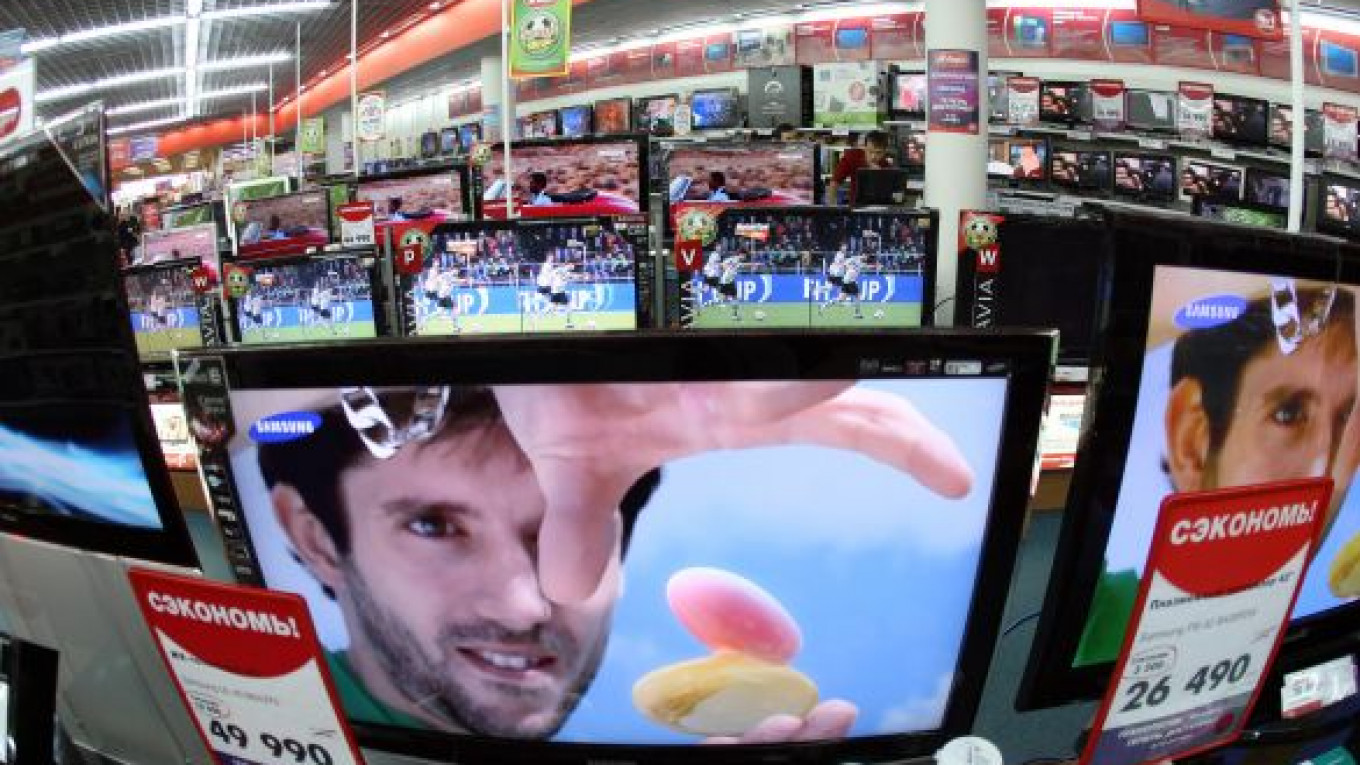Gazprom-Media has thrown down the gauntlet at Video International, the country's largest seller of television advertising, accusing it of coordinating its actions with TV channels and limiting competition.
The holding filed a complaint with the Federal Anti-Monopoly Service, Sergei Piskarev, the head of Gazprom-Media's sales house, told Vedomosti. He said he thought that Video International and the channels it serves were secretly agreeing on their pricing policies and violating Article 11 of the law on competition.
Gazprom-Media's complaint was received Nov. 25, service spokeswoman Irina Kashunina said. The letter did not include any evidence, and the service has asked for more information so that it can decide what to do, she said.
Piskarev said he would provide the evidence after he receives a response.
Video International is essentially Gazprom-Media's only competitor on the television advertising market. Another prominent television seller, Alkasar, frequently works as a partner with Gazprom-Media.
Video International sells advertising on Channel One, the state VGTRK holding, CTC Media and Prof-Media, covering a total of 12 channels. Next year, its portfolio will also include the channels owned by National Media Group: Ren-TV and St. Petersburg's Channel 5. NMG's channels are now serviced by Gazprom-Media.
Analysts surveyed by Vedomosti said they believed that Gazprom-Media turned to the anti-monopoly service because it lost the NMG contract.
"They took Ren-TV away from Piskarev. It's a channel that's in high demand among advertisers. So you can understand where he's coming from," said Artyom Donets, chief operating officer at Sorec Media.
But all of the market participants interviewed by Vedomosti said Gazprom-Media had been losing market share for some time. When the crisis began, companies began slicing their marketing budgets, and some big advertisers kept their TV advertising only on Video International's channels.
The decision was based on the company's portfolio, as well as the fact that Video International signs multiyear contracts, which are harder to break than Gazprom-Media's one-year agreements. Video International also gave big bonuses to companies that gave them all of their TV budgets, executives at two ad agencies told Vedomosti.
Federal Anti-Monopoly Service deputy head Andrei Kashevarov said the service has been conducting an investigation into Video International's possible dominating position on the market for the past two weeks after it learned of the contract with NMG.
He said the investigation would take at least three months because of complications in calculating Video International's market share for television advertising.
The company could be declared a monopolist if its share is above 35 percent. Television ads are sold by gross rating points, or GRPs, which measure total TV viewers seeing an advertisement. According to Media Logics, Gazprom-Media sold 23.6 percent of all GRPs on national TV in October, down from 26.5 percent in October 2008. Video International had 67 percent, up from 62.7 percent.
But what that means in terms of money is unclear, since CTC Media is the only company serviced by Video International that releases its earnings. Video International only releases its sales, which were $4 billion in 2008, but that also includes all media and the group's sales outside Russia.
According to industry association AKAR, television channels earned 137.6 billion rubles ($4.7 billion) from advertising last year. If you subtract Gazprom-Media's 38.8 billion rubles and assume that other sellers had at least 10 percent, Video International's share would still be more than half.
Spokespeople for television channels denied that they were coordinating with Video International and other stations.
"We don't coordinate our actions with other channels. Gazprom-Media's accusations are baseless," CTC Media spokeswoman Yekaterina Osadchaya said.
The head of one TV station said he thought that Gazprom-Media's war with the country's largest advertising holding wouldn't lead to anything good. Once the state starts seriously regulating the ad market, the biggest advertisers — local branches of Western companies — will start pulling their money out of TV advertising, he said.
The heads of three large ad agencies also said it did not make sense to fight Video International, since it is essentially acting as a regulator, which stabilizes the market.
But one of Vedomosti's market sources took Gazprom-Media's side. "Everyone knows that Video International is a monopolist, virtually all channels work through it, which clearly contradicts the law."
The market sources said Gazprom-Media's fight would be waged at the very highest levels of government. Two weeks ago, the founder of Video International, Mikhail Lesin, was fired as a Kremlin adviser with a harsh reprimand.
The presidential administration declined to comment on whether Lesin's departure had to do with the standoff on the television market.
Spokespeople for Video International, Channel One and VGTRK declined comment.
This isn't the first time that the Federal Anti-Monopoly Service has investigated possible monopolistic behavior by Video International. The service concluded a two-year investigation in 2007, and its chief, Igor Artemyev, said the body decided not to treat various advertising platforms as separate markets.
A Message from The Moscow Times:
Dear readers,
We are facing unprecedented challenges. Russia's Prosecutor General's Office has designated The Moscow Times as an "undesirable" organization, criminalizing our work and putting our staff at risk of prosecution. This follows our earlier unjust labeling as a "foreign agent."
These actions are direct attempts to silence independent journalism in Russia. The authorities claim our work "discredits the decisions of the Russian leadership." We see things differently: we strive to provide accurate, unbiased reporting on Russia.
We, the journalists of The Moscow Times, refuse to be silenced. But to continue our work, we need your help.
Your support, no matter how small, makes a world of difference. If you can, please support us monthly starting from just $2. It's quick to set up, and every contribution makes a significant impact.
By supporting The Moscow Times, you're defending open, independent journalism in the face of repression. Thank you for standing with us.
Remind me later.


